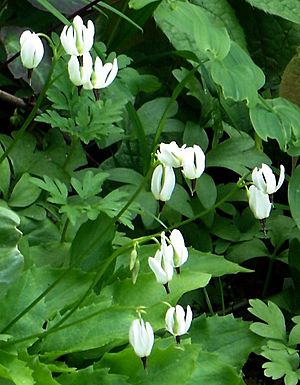Dodecatheon dentatum facts for kids
Quick facts for kids Dodecatheon dentatum |
|
|---|---|
 |
|
| Conservation status | |
| Scientific classification | |
| Kingdom: | |
| (unranked): | |
| (unranked): | |
| (unranked): | |
| Order: | |
| Family: | |
| Genus: |
Dodecatheon
|
| Species: |
D. dentatum
|
| Binomial name | |
| Dodecatheon dentatum |
|
The white shooting star (scientific name: Dodecatheon dentatum) is a type of flowering plant. It belongs to the Primulaceae family, which also includes primroses. People sometimes call it the toothed American cowslip too.
This plant grows naturally in western North America. You can find it in places like Arizona, British Columbia, Idaho, New Mexico, Oregon, Utah, and Washington (state). It also grows in Chihuahua, Mexico.
What Does It Look Like?
The white shooting star is an herbaceous perennial. This means it's a plant with soft stems, not woody ones like a tree. It also lives for more than two years, coming back each spring. It can grow to be about 40 to 50 centimeters (about 16 to 20 inches) tall.
Its leaves are special because they have small "teeth" along their edges. This is why one of its common names is "toothed American cowslip." The leaves are shaped like pointed ovals. They can be up to 10 cm (4 inches) long and 6 cm (2.4 inches) wide. Each leaf grows on a long stem called a petiole.
The Flowers
The plant produces a group of flowers called an inflorescence. This cluster can have anywhere from 1 to 12 flowers. They grow on a tall, straight stalk. Each flower has five white petals, about 1 to 2 centimeters long. These petals bend backward, away from the flower's center.
In the middle of the flower, you'll see a style (part of the female reproductive organ). It's surrounded by large anthers, which hold pollen. These anthers can be reddish, purplish, or black. The white shooting star usually blooms from May to July.
This plant is unique because it's the only shooting star species that consistently has white flowers. However, in Utah, some flowers might be pink or light purple. In other areas, the petals are usually white or cream. The stamens can also vary in color. Plants in Arizona and New Mexico have yellow stamens, while those in the Pacific Northwest have dark maroon or black ones.
Growing White Shooting Stars
People often grow the white shooting star in their gardens. It's a popular ornamental plant because of its pretty flowers. It's especially good for shady gardens that use native plants.
This plant is very helpful for native bumble bees. They love to visit its flowers! After the plant finishes blooming, it usually goes dormant. This means it rests until the next growing season.
The white shooting star has even won an award! The Royal Horticultural Society gave it their Award of Garden Merit. This award recognizes plants that are excellent for gardening.
Images for kids
 | Bessie Coleman |
 | Spann Watson |
 | Jill E. Brown |
 | Sherman W. White |



